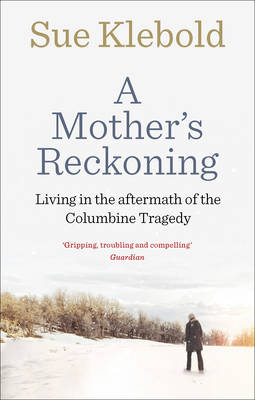This isn’t the kind of book I would usually read. I am not someone who thrills to tales of real life violence; the True Crime section in the bookshop is of no interest to me and although I do read in-depth newspaper and magazine articles, I try to steer clear of sensationalist nonsense that seems to glamorise crime. There’s a ton of that crap about though, so clearly there’s an audience.
Sue Klebold is the mother of Dylan Klebold, one of two teens who murdered 13 people at Columbine High School in 1999. Dylan Klebold and Eric Harris injured another 24 people, attempted to kill many more with home made bombs which failed to detonate, and committed suicide. I haven’t read anything beyond news reports at that time, did not want to read assumptions and theories about what happened, but was interested to hear that Sue Klebold had written a book and curious to know what she had to say. I imagined it would be a painful read, and I approached it with empathy – I am a mother of teens, I know our teens make choices that aren’t comfortable for us, but this horror is unimaginable and unbearable. There are those who squarely blame the parents – how could they not have seen who their sons were? That’s not how I think, but how do you live with that anger against you, that level of blame? How do you endure when your son is revealed to be a hate filled murderer?
This book is Sue Klebold’s attempt to do something positive. She wants to alert people to the signs she missed in her own son (that he had “brain illness”, that he was depressed, bullied, at break point. She aligns herself with other mothers of kids who committed suicide, albeit murder-suicide, and speaks about how her son wanted to die. Unlike Eric Harris, who wanted to kill. There is a clear distinction.)
Sometimes people speak passionately and the words are vivid and maybe a little messy, but heartfelt, and other times, usually when professionals speak, each word has been carefully chosen and the delivery is dry and careful. This book is the latter. It reads as if lawyers have combed through it 1,000 times for anything potentially damaging. There is nothing here but a few descriptions of her son, meaningless to anyone except her family, a few anecdotes that present him as “normal”, a lot of scientific evidence of brain illness, and an avoidance of anything potentially controversial. The first few chapters describe her disbelief as the police turn up at her home immediately after the shootings. She has no access to news but bits filter through as she waits outside while the house is searched, enough that she understands her son was involved. She assumes he was an unwilling participant, or didn’t understand what was happening, or was in thrall to Eric Harris. But she won’t describe the actual events, or what it felt like to comprehend the truth.
There is a necessary need not to offer a template for others, but what is left is not a compelling read. It’s a terrible story, but we do not learn anything here and Klebold seems reluctant to go beaneath the surface. Perhaps she can’t, our minds protect us from unbearable things, but it makes me wonder why she wrote this.
The most valuable thing in the book is not written by her. In the introduction, Andrew Solomon says, “…we want to believe that parents create criminals because in supposing that, we reassure ourselves that in our own house, where we are not doing such wrong things, we do not risk this calamity. I am aware of this delusion, because it was mine…
I came away thinking that the psychopathy behind the Columbine massacre could emerge in anyone’s household. It would be impossible to predict or recognise; like a tsunami, it would make a mockery of all our preparations.”
Which is chilling, but feels true to me. There is a tipping point when our children, necessarily so, grow away from us and all we can do is hope the foundations we have laid hold them steady. We can’t be responsible for their actions. Klebold’s efforts to get more recognition and support for people suffering mental illness is admirable and I applaud her determination to use this awful notoriety she has to do something positive. I don’t think this is a good book though. There are a variety of assertions made – “We’ve all felt angry enough to fantasise about killing someone else.” Well, no, actually I haven’t. “Most of us can’t name a single celebrity who has struggled–successfully anyway–with depression or another mood disorder…” Erm, well actually I can… There’s an attempt to present Dylan Klebold as a “normal” teen but offers scant evidence of it and all the while we know that behind his mother’s back he was writing diaries planning his suicide, filming vitriolic segments with Eric Harris, playing with guns, getting into trouble with the police.
Why would we want to judge Sue Klebold? Why would we need to? I hope she finds a peace in her activism and support. But this is a book review and this book is not great.

